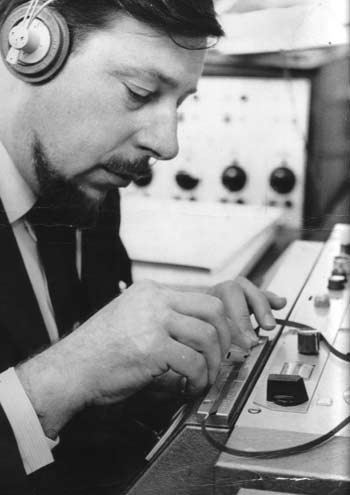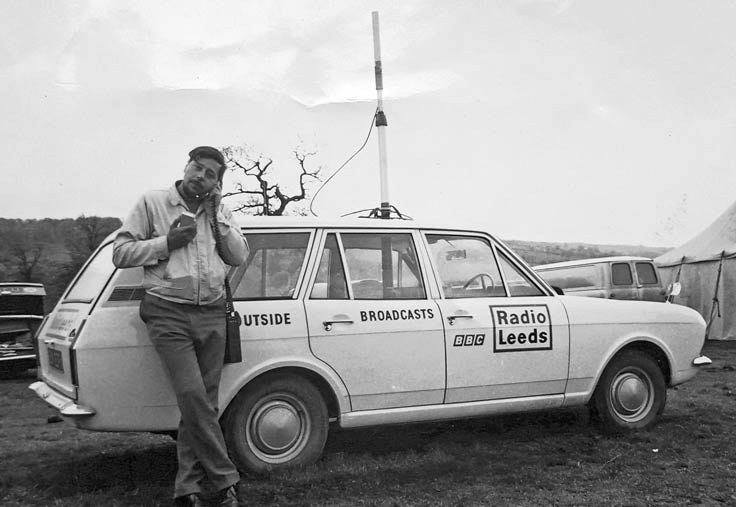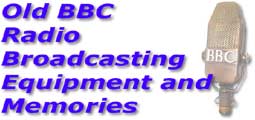Some youngsters leave school with no idea at all of what they want to do with their life. Some want to follow in father's footsteps. Some cannot make up their mind and some have a very definite idea of what they want to do.
With a war on and with Direction of Labour, all school leavers were sitting ducks for the labour market, and then entry into the armed forces. I, however, knew what I wanted to do. Or rather I knew where I wanted to go! I had, as a teenager, been fascinated by broadcasting and I had already started tinkering with what would now be called electronics. When I found out that a school friend who was a year older than me had managed to get taken on by the BBC (he was working at the line switching centre at Salisbury) I recognised that this was the way to break out of whatever mould was being cast for me. I knew not where it would lead but I sure as hell knew it would lead in a direction that I would be happy to go.
When I arrived at Broadcasting House in Birmingham on Monday, December 3rd, 1941 and said I had been told to report that morning the commissionaire looked at a clipboard and asked me my name. When I told him he said "Right, go up to Room 104!" Without further ado I headed up the stairs for the interior and started looking for Room 104. This was Mr Chatwin's room and on presenting myself, he asked me to give him a few minutes then he would show me around! BH, as it was called, was an odd building. It must be remembered that I was born in 1925 and the BBC not long before! Neither of us was very old.
There were, all told, about 50 or 60 people in Birmingham BBC, including some 20 in the Engineering Division. There were, I think, nine regional centres, some wartime centres, the transmitting sites, and of course the London set up. My staff number was 12772 and if numbering had started 15 years before and you allowed for those who had left or been called up I guess there could not have been more than four or five thousand people employed by the BBC.
Broad Street
The first Birmingham station was housed in the
GEC works at Witton - a very inconvenient site for artists. The studio
was moved to New Street in August 1923 and then to Broad Street at the
end of 1925.
The windows of the control room, which had heavy steel shutters, looked over the flat roof of the shops. There were 5 studios of varying size. Studio 4, the largest, could house a fair sized orchestra, there was a small music studio and three talks studios. In the basement was an ECR, an Emergency Control Room built with reinforcing and steel shutters and air proofing. Its fresh air was supplied by two fans, one inlet and one outlet, but they had sliding steel sheets that could obscure the fans in the event of a gas attack. One of the shops had been converted into a staff canteen. After the tour I was handed over to the SME on duty. The Senior Maintenance Engineer was in charge of a shift, of which there were three to give round the clock coverage. I was to work in the control room.
Each shift had an SME, an ASME, a maintenance engineer, a WO (woman operator) and two or three youngsters starting off as YiTs - Youths in Training, who would later become JMEs (Junior Maintenance Engineers). I started off with the princely wage of 25 shillings a week. Everyone was very friendly and they all spent time showing me over the control room and explaining what went on.
Sitting with our backs to the window, there was a long console at which we all sat. In the middle was a small engineering manual telephone exchange where the studio telephones terminated, as did the control circuits to all the other BBC stations - London, Bristol, Daventry, Droitwich, Manchester, Kidderminster, Wood Norton, the Shrewsbury 'H' group transmitter (see below) and Place 'P'. The latter was a secret place that the government would use in the event of the south-east of England being invaded. We understood it was somewhere in north Wales but its precise location was never disclosed to us.
Nearly all the apparatus, studio output amplifiers, line feed and line receive amplifiers were battery operated using triode valves. Some newer wartime amplifiers were mains operated using ACSP/3 pentode valves.
Next to the control room was a large battery room full of accumulators. Rows and rows of large glass tanks like aquariums, open topped. There were two HT batteries, two LT batteries and two 24 volt batteries for relay operation. One of each was on charge while the other was in use. Hourly voltage checks were made and the specific gravity was checked and noted down in a log book. When necessary they were topped up with either water or sulphuric acid. This was one of my first tasks. The atmosphere was acid laden and one's fingerprints tended to get worn down by the acid! To the right of the control room were two monitoring rooms, each with enormous loudspeakers about 5 feet high.
The second task I learned was to monitor the Home Service and fill in a log. The start and end times of all programme contributions and their origin had to be logged. As were Continuity announcements. All silences were logged and all faults were noted. Any irregularities were logged and the control room informed. Such things as teleprinter interference, line noise, crosstalk and level variations all had to be logged. Maintenance was a daily chore. Cleaning the plugs on all double-enders, headphones and single-enders on the exchange position with metal polish was carried out regularly.
All the SB circuits were interrupted at PO repeater stations and a small control room built and operated. There was one at Salisbury (between London and Bristol) another one at Warrington. I used to have to take my turn in going to the emergency studio centre at Kidderminster. This was a large private house in its own grounds. There was a very small control room and 3 studios, all nicely 'done out' in a pale yellow wall wash, and with a microphone table with a Type A ribbon mic in each. The chore was to switch everything on and do a voice test from each. It made a nice afternoon out!
Returning to the 'H' Group transmitters mentioned earlier, these were a chain of sixty low power medium wave transmitters varying from 50W to 1kW and all transmitting the Home service on the same wavelength of 203 metres. They served a dual purpose. First, they didn't have to be closed down on the approach of enemy aircraft, because their range was reputedly only a few miles - although each transmitter carried out a test transmission once a month, according to a schedule, so that Tatsfield, the BBCs monitoring station, could check the accuracy of the frequency of transmission and make sure it had not drifted. Sixty transmitters not quite on the same wavelength would have made reception horrible with superheterodyne whistles.
The second purpose was to provide regional devolved governments a voice to the local population in the event of a breakdown of central control. Many of these stations were kept on as part of the post war civil defence arrangements. The transmitters were a motley collection, culled from all sources. There were a number of American 300 watt RCA transmitters built, I believe, for the US local radio scene. The one in Birmingham was blitzed before I started working for the BBC. There was one in Shrewsbury castle, where the transmitter room had eight foot thick walls and the aerial came out of a small slit window and ran up the tower. It was just a long wire.

Geoff, probably at Leeds, c.1969
After beginning as a Youth in Training I had a short period as a Junior Maintenance Engineer until the post was abolished and I became a Technical Assistant, although when I was called up in July 1944, after a short deferment, I was listed as a charge hand, wireless transmitting and receiving equipment! I spent my army career(?) in the Royal Signals training as a line mechanic (long distance line communication) and ended up living in civvy clothes in Turkey, installing and maintaining 3 channel carrier telephony equipment for the Turkish Post Office (and cannibalising 50 Creed teleprinters for the Turkish army). I returned to the BBC in January 1948 as a TA in the control room at 200 Oxford Street and became a Junior Programme Engineer, later retitled Studio Assistant. In 1951 I went to sound Features department, first doing the sound effects then as a Studio Manager. I did a number of attachments to TV Presentation and TV News as a PA, and as a radio producer for BFN. Then joined local radio 1968 as a PA, later renamed producer, first in Leeds and then in Medway until my retirement in 1980.

Sadly, Geoff died in 2004. Roy Maynard writes:
I was sad to read that Geoff Leonard had died. I remember Geoff very well, we were in the old Features section of Programme Operations together in the early 50s and together as "commando" SMs in the mid 50s. He went to join Radio Medway teaming up with two more ex-1950s Features SMs, Harry Rogers OBE (Station Manager) and Denis Lewell (Senior Assistant). A formable combination, I can assure you. He was an excellent team man and a dedicated BBC person.
Pete Simpkin recalls working with Geoff at Leeds in the early seventies:
Geoff was a wonderful character. I worked with him on a variety series called 'Sit Down and Sing', based on the hundreds of working mens clubs in the area. Equipment was the standard Local Radio OB mixer (a six channel version of the famous Mark 1 studio desk) and five AKG D202 mics on adjustable stands. Geoff would just tell you to follow him and the presenter, an organist called Arnold Loxam, as they wove together a programme live on stage, introducing act after act ranging from groups to solo singers and comedians. You had roughly the period of time taken for the applause following the introduction of each act to place your four mics (the fifth was permanantly rigged on the audience) in front of the performers and retreat to the side of the stage to do the balance and record. After recording two programmes in a night we would be transported back to the studios at the Merrion Centre at Geoff's blood stopping speeds in the Radio Car!

